The cities best prepared for a smart city future in 2024
Who’s leading the way in building tomorrow’s cities with technological advancements, green infrastructure, and more?
A smart city provides many benefits to its citizens and signals development, progressive values, and entrepreneurship to the wider world.
Living and working in a smart city may mean its design and planning are more data-driven, the city runs more sustainably, is more engaged with its citizens and their well-being, or is simply much easier to travel around than in the average urban area.
Our research
There are many ways to measure a smart city’s performance and proficiency in adapting to evolving digital technologies.
To determine which cities are the smartest in 2024, we analyzed 16 metrics related to connectivity and infrastructure, sustainability, and the tech job market. We then ranked cities in Europe and the United States and created an equally-weighted index.
Metrics considered:
1. Tech infrastructure and connectivity:

- The number of free WiFi hotspots
- The number of AI companies
- The number of AI companies per 100,000 people
- The number of IoT (Internet of Things) companies
- The number of IoT (Internet of Things) companies per 100,000 people
- Average broadband download speeds (Mbps)
- Median 5G coverage of population per network provider
- The number of airports
2. Green infrastructure:
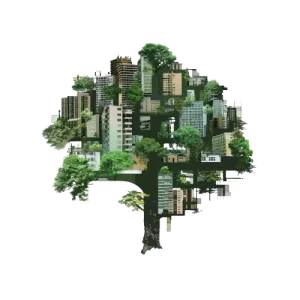
- Air quality (exposure to PM2.5)
- 10-year tree loss (hectares)
- 10-year tree gain (hectares)
- The number of electric vehicle charging points
- The number of electric vehicle charging points per 100,000 people
- The number of LEED-certified green buildings
3. Tech job market:

- The number of tech jobs advertised
- The number of tech jobs advertised per 100,000 people
Taking these 16 indicators into consideration, here are the results of our index that reveals which cities are best prepared for a smarter future.
Seattle, Washington, is the smartest U.S. city
Seattle overtakes last year’s winner, Austin, Texas, to rank as the smartest city in the United States in 2024, with an overall score of 75.7 out of 100.
Home to the likes of Amazon and Microsoft, Seattle scores highly in our research for tech infrastructure, with 34 AI companies and 13 IoT companies per 100,000 people.
Regarding sustainability, it has also increased its tree coverage by 13,700 hectares between 2010 and 2020 and built the equivalent of ten electric vehicle recharging points per 100,000 people.
The U.S. cities best prepared for a smart city future
The following U.S. cities are the best prepared for a smart city future, scored out of 100 and based on 16 metrics related to tech infrastructure and connectivity, sustainability, and the tech job market.
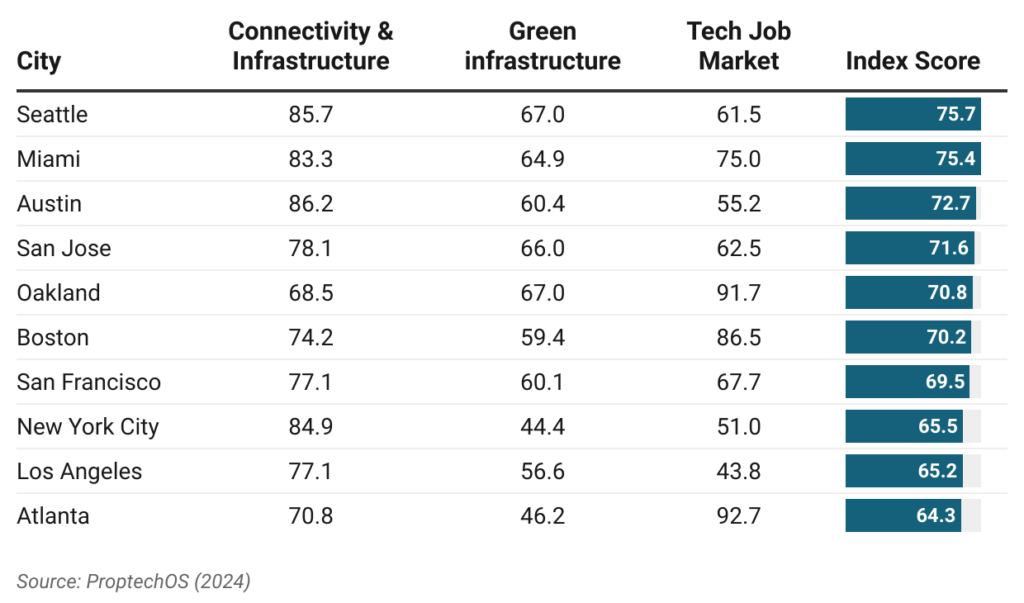
Austin, Texas, has the best infrastructure for a smart city
Of all the U.S. cities analyzed, Austin still comes out on top for smart city infrastructure, scoring 86.2 out of 100 in this category.
Culturally, Austin already celebrates the intersection of culture and technology with its annual SXSW event, which attracts more than 300,000 people each year.
The Texan city takes the top spot for infrastructure thanks to factors such as its high average broadband download speed of 275.60 Mbps, exceeding the U.S. average of 217.14 Mbps. Additionally, it is home to 337 AI companies, the equivalent of 35 per 100,000 people.
The smartest U.S. cities for connectivity and infrastructure
The following U.S. cities have the best smart city infrastructure, based on eight metrics related to internet connectivity, the presence of innovative companies within AI and the Internet of Things, and technological infrastructure.
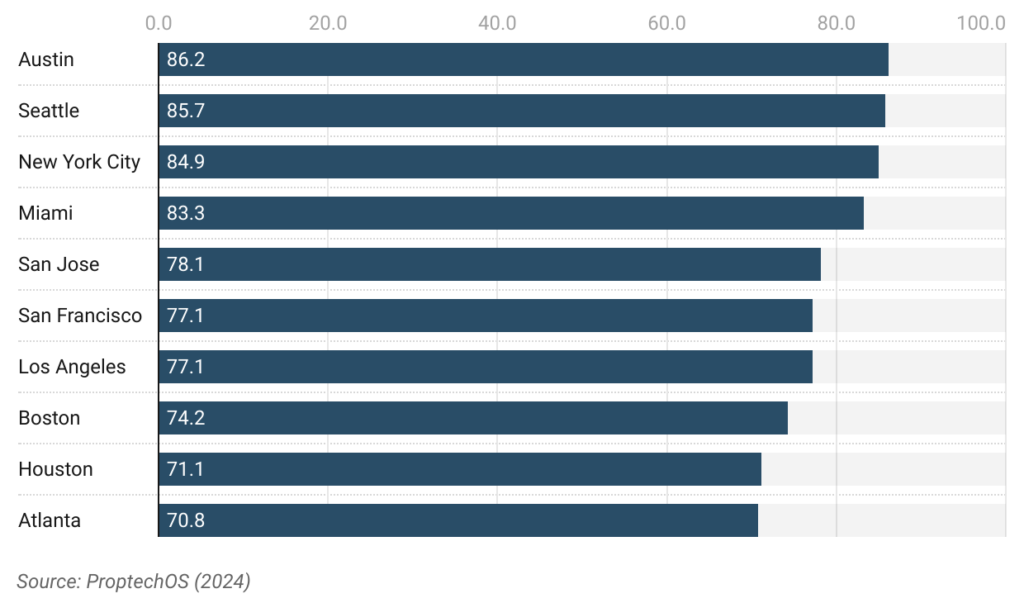
Kansas City, Missouri, scores highest for smarter sustainability
Kansas City is known for its green credentials, boasting over 12,000 acres of parkland. In 2022, local authorities announced plans to plant 10,000 more trees in the city within the next three years.
Our analysis shows Kansas City is also credited with expanding its tree coverage by 5,730 hectares over ten years. IQAir rates the air quality as ‘good,’ which is only achieved by 30 U.S. cities in our study. The number of EV charging points per 100,000 people is also one of the highest among American cities.
The smartest U.S. cities for green infrastructure
The following U.S. cities rank the highest for sustainability, based on six metrics related to air pollution, tree coverage, green building certification, and electric vehicle charging infrastructure.
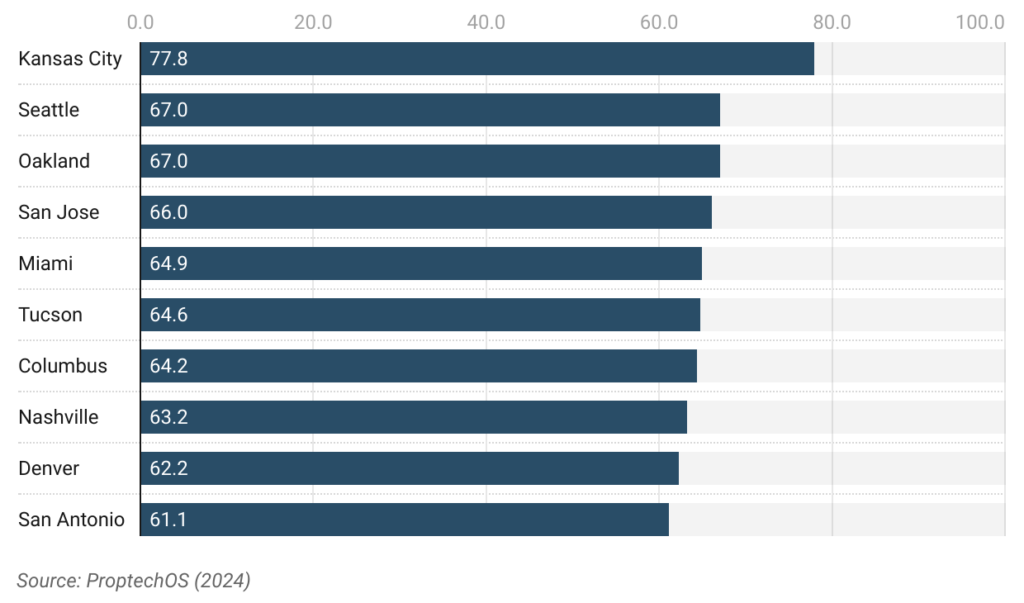
Washington, D.C., has the best tech job market in the United States
Washington, D.C., betters other well-known tech hubs in the U.S. for the size of its tech job market. With 50,203 tech jobs advertised at any one time, equivalent to an impressive 794.7 tech jobs available per 100,000 people.
Figures from StartupGnome show that Washington also excels in several metrics related to tech innovation, growth, and employment. More than 16,000 tech companies are located there, and the average software engineering salary is more than double the national average.
In second place is Atlanta, Georgia, whose flagship Georgia Tech produces the most technology graduates per year, and its growing reputation in the technology industry has seen companies such as Apple, Alphabet, Microsoft, and Visa open offices in the city.
The U.S. cities with the best tech job market
The following U.S. cities have the best tech job market, based on the number of tech job postings and the number of tech job postings per 100,000 people in each city.
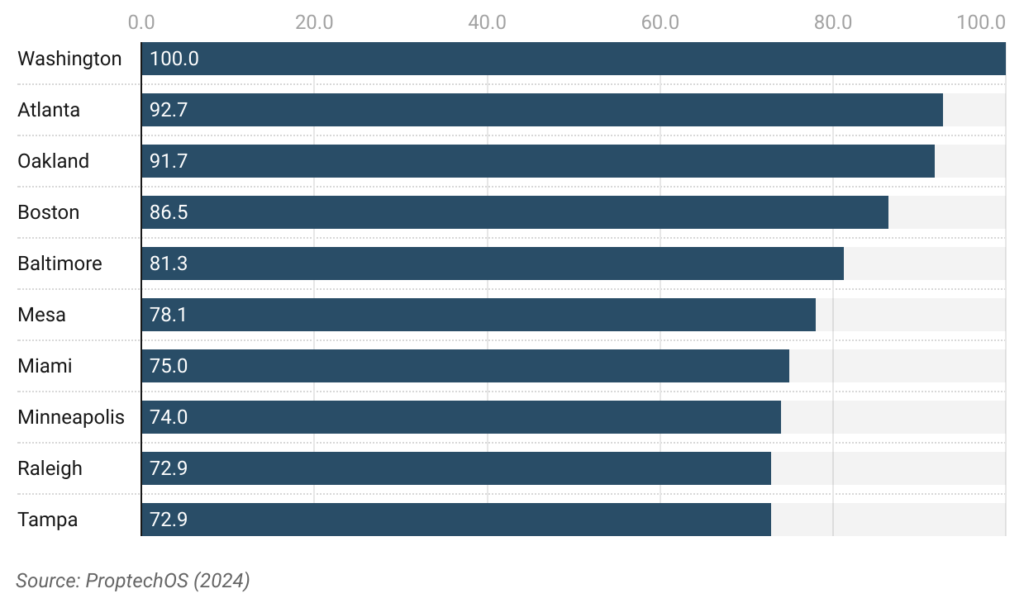
Paris is Europe’s smartest city
The French capital, Paris, ranks the highest in Europe among cities best prepared for a smart city future, with an overall score of 76.4, overtaking last year’s winner, London.
Paris is boosted by several impressive metrics, including 99.9% 5G coverage* of the population by the average network provider, Europe’s second-highest number (532) of AI specialist companies, and the third-highest number (10,663) of free Wi-Fi hotspots.
Paris is also known for its smart traffic management systems, which help monitor noise levels, air quality, and other environmental factors.
*Nperf provided 5G coverage data by population for the United States and Europe.
The European cities best prepared for a smart city future
The following European cities are the best prepared for a smart city future, scored out of 100 and based on 16 metrics related to tech infrastructure and connectivity, sustainability, and the tech job market.
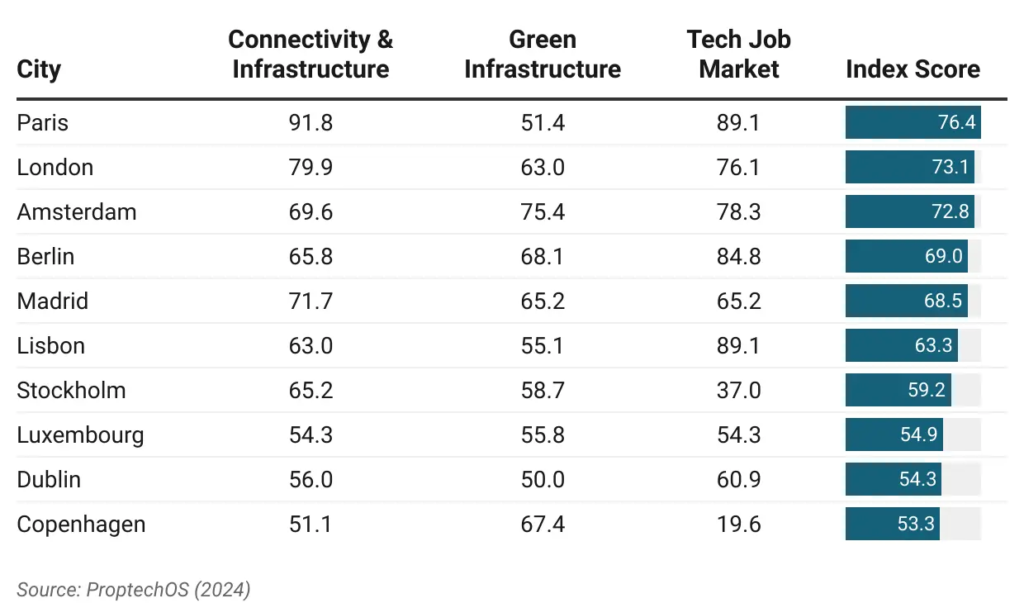
Paris’s smart infrastructure and connectivity trumps other European cities
The smartest European city also ranks highest in infrastructure and connectivity, scoring 91.8 out of 100 in this category.
Paris has many smart infrastructure features, including the third-highest number (145) of Internet of Things companies headquartered there and the fifth-highest average download speed for its fixed broadband at 173.06 Mbps.
The smartest European cities for connectivity and infrastructure
The following European cities have the best smart city infrastructure, based on eight metrics related to internet connectivity, the presence of innovative companies within AI and the Internet of Things, and technological infrastructure.
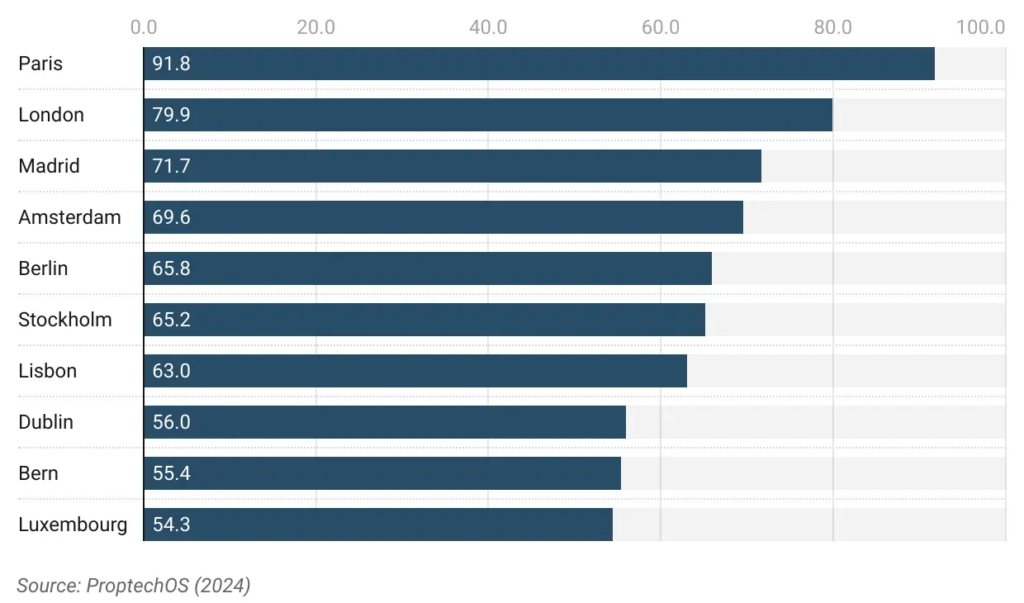
Amsterdam is Europe’s smartest for sustainability
The canal-lined city of Amsterdam scores the highest (75.4 out of 100) among Europe’s smart cities for sustainability factors.
Already known for its favored eco-friendly mode of transport, the bicycle, the city also aims to become the first European city to hit zero CO2 emissions by 2050.
It has more green-certified buildings (553) than any other city in our index and the most electric vehicle recharging stations relative to its population size (67 per 100,000 people).
The smartest European cities for green infrastructure
The following European cities rank the highest for sustainability, based on six metrics related to air pollution, tree coverage, green building certification, and electric vehicle charging infrastructure.
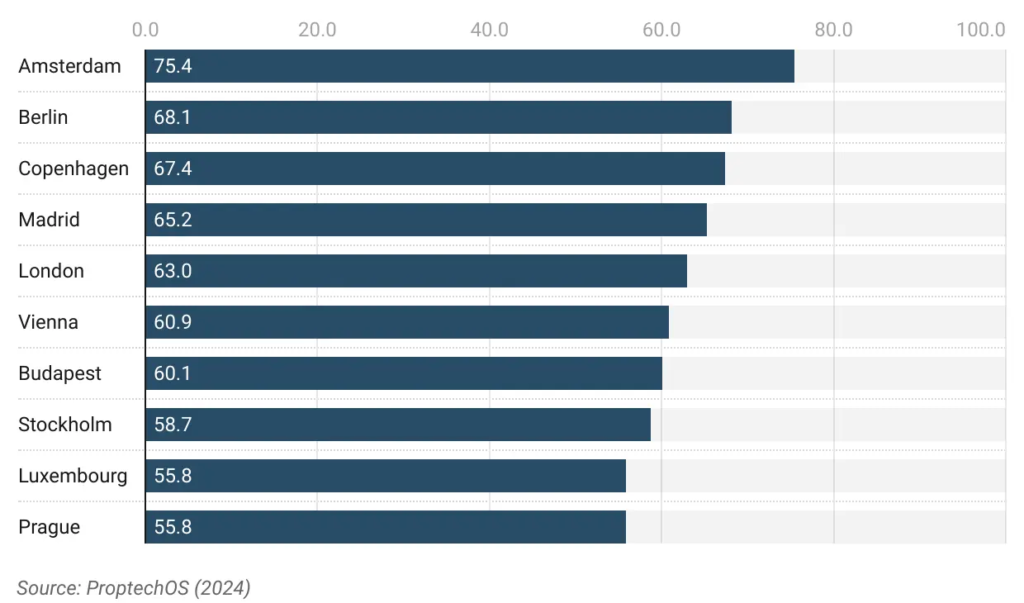
Lisbon and Paris lead the way in Europe for tech jobs
Lisbon climbs to the top for tech jobs alongside Paris, the smartest city in Europe, scoring 89.1 out of 100 in this category.
While Paris has over twice as many tech jobs as Lisbon due to its sheer size, the Portuguese capital ranks much more favorably for tech jobs per 100,000 people, with 130 compared to Paris’s 62.
Many factors have contributed to Lisbon’s growth as a tech hub. Beyond favorable government and tax incentives, the city boasts some of the world’s highest numbers of developers and engineers per capita.
The European cities with the best tech job market
The following European cities have the best tech job market, based on the number of tech job postings and the number of tech job postings per 100,000 people in each city.
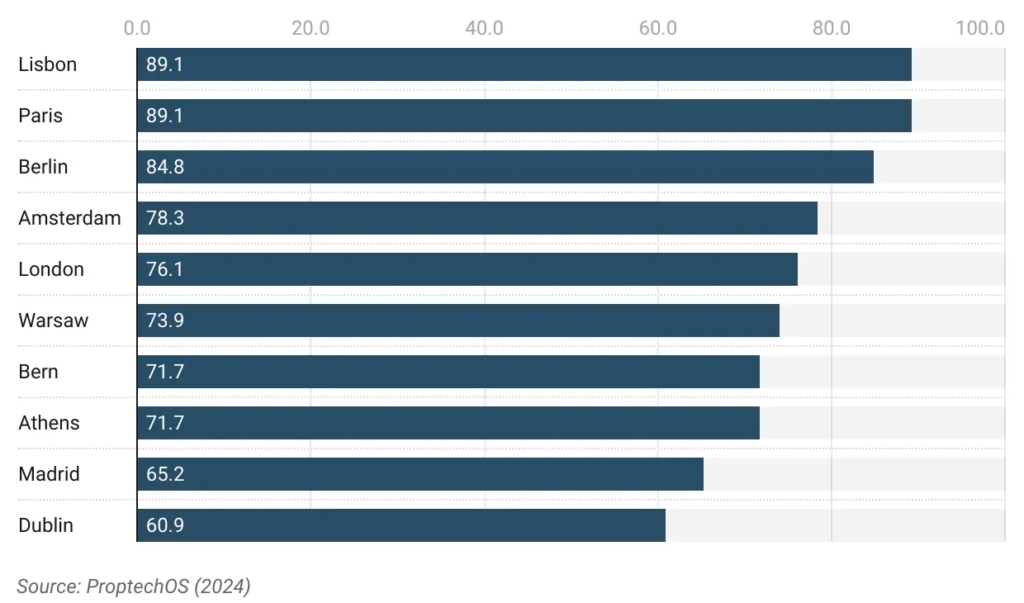
Methodology
To assess the smartest cities in the United States and Europe, we analyzed 16 equally-weighted metrics across three categories: connectivity and infrastructure, sustainability, and the local tech job market. Our criteria align with the OECD’s guidelines for smart cities. Our study encompassed 68 cities, including the 48 largest cities by population in the United States and 23 capital cities across Europe, with comparable data.
Each metric was standardized and scored on a scale of 0 to 100 to ensure comparability across different data points. The analysis was conducted in April 2024.
For questions or queries, contact:
Anna Lundvall-Hedin
Marketing Manager
[email protected]